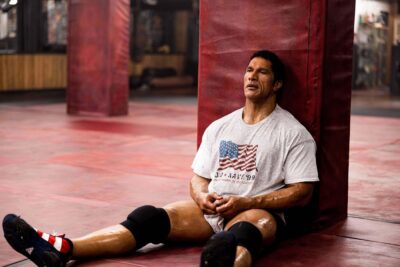Movie Review: Dwayne Johnson has never been better in ‘The Smashing Machine,’ but the movie dodges
By Canadian Press on October 2, 2025.

Benny Safdie’s “The Smashing Machine” isn’t what you think it is, especially if you think it’s a movie about a British guy who thinks his typewriter is the tops.
“The Smashing Machine” would seem to bear all the hallmarks of something grittier, darker and more disturbing than it is. It’s the solo directorial debut of the younger Safdie, whose films with his brother, Josh, have rarely not sprinted headlong into unsettling tumult. Add that sensibility to a true-life tale of a mixed martial arts fighter in the late ’90s, and it’s only natural to spend much of “The Smashing Machine” bracing for tragedy, for some ear-splitting descent into macho calamity.
Yet “The Smashing Machine,” starring Dwayne Johnson as MMA pioneer Mark Kerr, is something simpler and less curious. A lack of probing was never anything you could accuse a Safdie brothers’ movie of; these are the filmmakers who plunged a camera into the body cavity of a jewelry-store owner in “Uncut Gems.” But, despite its grainy, VHS aesthetics, “The Smashing Machine” is a surprisingly conventional and oddly untroubled movie, albeit one that gives Johnson an indie-film platform for one of his finest performances.
As Mark, Johnson has drained away much of his big-screen charisma. The part — brawny, often shirtless, frequently raging in the ring — is immediately so close to Johnson’s own professional wrestling background that early scenes look almost documentary-like. But gone is the megawatt grin and the dashing eyebrow lift. Johnson’s normally polished bald head is here covered with a closely cropped dark head of hair.
In the movie’s opening, Mark rhapsodizes about his feeling of domination. An opponent’s fear, he says, you can “smell in their scent.” At this point, Mark has known only victory in thumping triumphs that leave him feeling like a god. Losing, he confesses, is unfathomable.
The laws of moviedom decree, of course, that Mark will soon lose, and his well-earned sense of invincibility will shatter. “The Smashing Machine” bounces between Mark’s home and Japan, where the Pride Fighting Championship takes place. That’s where Mark, a much-celebrated champion, is taken down by an illegal but nevertheless humbling move. After the fact, the match is ruled a tie, but the stink of defeat never dissipates.
The real battle, in any case, is at home. Mark’s dependence on opioids for the punishing extremes he endures is becoming desperate. “The Smashing Machine” is based on John Hyams’s 2002 documentary of the same name, and part of the nature of that film was the curiosity of Mark’s extreme violence in the ring and his otherwise sweet passivity. In Safdie’s film, Mark is asked in the doctor’s waiting room if fighters hate each other during a bout. “Absolutely not,” he replies.
But while we don’t doubt Mark’s sincerity — he’s as earnest as he is muscle-bound — Johnson also exudes an inner turmoil, and a struggle to keep his rage at bay while nursing mounting wounds to his ego. His body is so stiff, it’s like he could snap at any moment.
That’s the case for Mark, most of all, around his wife, Dawn Staples (Emily Blunt), a former Playboy model who’s shown as alternatively supportive and insensitive to Mark’s situation. They feud often, sometimes immediately before a match, sometimes over how to make his shakes. When he tries to give up opioids, he takes her late-night drinking as a provocation. “Treat me like a man,” he tells her.
It’s an awkward, perhaps judgmental characterization that would be all the more glaring if it weren’t for Blunt’s tact as a performer. But it throws “The Smashing Machine” off course, especially when the movie seems to want to lean more on its other central relationship: that of Mark and his friend, trainer and sometimes competitor Mark Coleman (played by former Bellator champion Ryan Bader).
In his films with his brother, Safdie has long brought real-life figures into their movie worlds, blurring fictional boundaries. Bader gives “The Smashing Machine” a dose of documentary in his presence, but I’d argue that Johnson’s proximity to this world gives the movie its most compelling real-life echoes.
I happen to think Johnson is also very good in full movie-star mode, especially when he has the chance to wryly undercut his big-screen presence in comedies like “Jumanji: Welcome to the Jungle” or “The Tooth Fairy.” But it’s also captivating to see him so thoroughly settled into a character like he is in “The Smashing Machine” while totally shorn of his charisma.
Yet the potency of that performance is let down by a movie that fails to really grapple with the violent world around Mark, resorting instead for a blander appreciation of these MMA combatants. What does resonate, though, is the portrait of a human colossus who learns to accept defeat — a mountain of a man who looks like he could, without barely trying, rip someone’s head off at any moment. Instead he takes a deep breath, and doesn’t.
“The Smashing Machine,” an A24 release, is rated R by the Motion Picture Association for language and some drug abuse. Running time: 123 minutes. Two and a half stars out of four.
Jake Coyle, The Associated Press
-17




